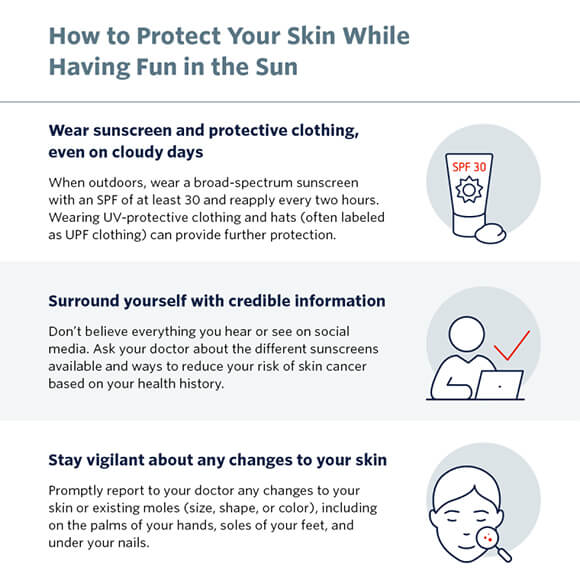
Mega Doctor News
By American College of Surgeons (ACS)
Newswise — CHICAGO – Skin cancer is by far the most commonly diagnosed cancer, affecting an estimated 1 in 5 Americans in their lifetime, but it is also one of the most preventable types of cancer.
“The vast majority of skin cancers are caused by sun exposure throughout our lives,” said Jeffrey M. Farma, MD, FACS, a surgical oncologist and American College of Surgeons Commission on Cancer (CoC) State Chair of Pennsylvania. “When it comes to skin cancer, prevention is key. My goal is to ensure patients can enjoy their lives, including time in the sun, while being mindful that even a small skin lesion can quickly escalate into a very serious issue.”
According to Dr. Farma, who chairs the department of surgery at Fox Chase Cancer Center in Philadelphia, Pennsylvania, and is surgical director of their Melanoma and Skin Cancer Program, it’s important to remember that anyone can get skin cancer, even if you don’t burn easily, and the disease is commonly diagnosed in both older and younger populations.
In fact, in adults 55 and older, rates of melanoma have increased by about 7% every year since 2011, and skin cancer rates have remained steady each year in younger people, according to the National Cancer Database, a clinical oncology database jointly run by the CoC and American Cancer Society.* While highly preventable, melanoma is one of the deadliest of all skin cancers.
“We have seen young patients in their 20s who tan a lot and use tanning salons and are unfortunately diagnosed with skin cancer,” Dr. Farma said. “That diagnosis can completely change their life.”
Dr. Farma offers these three tips to protect yourself while enjoying time outdoors:

- Apply sunscreen properly, even on cloudy days: When planning to be outside, wearing a broad-spectrum sunscreen with an SPF of at least 30 is one of the smartest things you can do for your health, even if you tend to tan and not burn, Dr. Farma notes. “It’s not just people who have fair skin and freckles that get skin cancer. You can get skin cancer with any skin pigmentation,” he said. Dr. Farma advises applying sunscreen during all seasons, including the winter, since any prolonged exposure to the sun can cause skin damage. Certain activities, such as boating or skiing, can foster particularly dangerous conditions since water and snow are reflective and may increase UV exposure. Although wearing sunscreen is one of the most important preventive efforts, it only works when applied properly and often. “A lot of people use too little sunscreen and don’t reapply,” Dr. Farma said. He advises reapplying sunscreen on exposed body parts every two hours, especially if swimming or sweating a lot. Setting a reminder on your phone or smartwatch may help you remember when to reapply sunscreen, and if using a spray sunscreen, avoid inhaling it and spray it away from children and pets. Additionally, wearing UV-protective clothing and hats (often labeled as UPF clothing) can add another layer of protection when outside.
- Surround yourself with credible information: Seek out information from reputable sources. The rise of social media means more information is at your fingertips, and it also means that medical misinformation from unreliable sources spreads more rapidly. “For instance, some people think getting an initial tan or burn in the summer is healthy and provides protection against burns for the rest of the summer,” Dr. Farma said. “That’s a big misnomer; that is still damaging and putting you at risk for damaging sun exposures.” Another troubling misconception: online posts that link wearing sunscreen to cancer, a misnomer that Dr. Farma notes is not based on credible research. “Sunscreen has a proven track record and benefit of decreasing the risk of UV exposure,” he said. A dermatologist or primary care physician can offer credible recommendations for skin cancer prevention depending on your health history and habits, such as if you work outside or use tanning salons, which can increase your risk of skin cancer. They can also help answer questions about the different types of sunscreen available, which are usually chemical or mineral-based and work differently to protect the skin from UV exposure.
- Stay vigilant about any changes to your skin: Like most cancers, early detection is key to preventing skin cancer from turning more serious. Dr. Farma recommends being mindful of any changes to your skin, even on areas of the body that aren’t often exposed to the sun. “There are rare skin cancers that occur on the palms of the hands, soles of the feet, under the nails, or elsewhere that can lead to significant problems when there’s a delay in diagnosis,” he said. By identifying potential areas of concern quickly and reporting them to your primary care physician or dermatologist, outcomes for skin cancer can be greatly improved. The American Cancer Society offers specific tips for checking your skin.
Treatment options for skin cancer
For people diagnosed with skin cancer, treatment will depend on the type of skin cancer diagnosed. Basal and squamous cell skin cancers can often be treated through non-invasive methods such as local excision or Mohs Surgery, whereas melanoma, which arises from the melanoma cells of the body that give skin its pigmentation, or other rarer types of skin cancer, may require more extensive surgery and an interdisciplinary team approach if the cancer has spread. Dr. Farma stresses that surgeons play an integral role in treating skin cancer, and many new therapies, such as immunotherapy, targeted therapy, and newer adoptive cellular therapy, are allowing patients to have improved outcomes.
“The surgeon really is a critical team member involved in the whole continuum of treatment for skin cancer, from education and screening,” he said. “As surgeons, we’re actively working together to limit the amount of side effects for patients and help them improve their outcomes and survival so they can get back to living their life.”
Journalists may contact pressinquiry@facs.org to schedule an interview with Dr. Farma.
*The National Cancer Database (NCDB) is jointly operated by the CoC and the American Cancer Society and captures approximately 74% of all cancer cases diagnosed in the United States. Since melanoma is often diagnosed in the outpatient setting, the NCDB captures about 52% of melanoma cancers diagnosed at CoC-accredited facilities.
About the American College of Surgeons
The American College of Surgeons (ACS) is a scientific and educational organization of surgeons that was founded in 1913 to raise the standards of surgical practice and improve the quality of care for all surgical patients. The ACS is dedicated to the ethical and competent practice of surgery. Its achievements have significantly influenced the course of scientific surgery in America and have established it as an important advocate for all surgical patients. The ACS has approximately 90,000 members and is the largest organization of surgeons in the world. “FACS” designates that a surgeon is a Fellow of the ACS.











